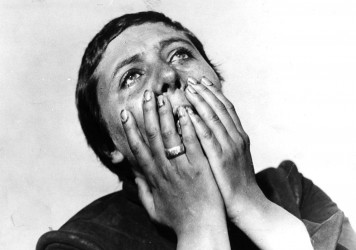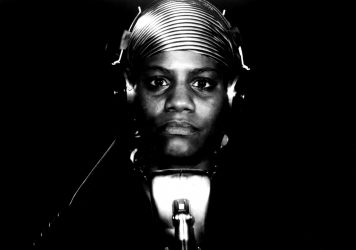
The “sculptress of sound”, “woman behind the wobbulator”, and the “heroine of British electronic music”, may all sound like impressive epithets for the late electronic musician Delia Derbyshire, but she is far from being a household name. A new film, Delia Derbyshire: The Myths and Legendary Tapes, which screened at this year’s BFI London Film Festival, seeks to rectify this by telling the story of a passionate and pioneering composer whose work for the BBC and later arrangement of the iconic Doctor Who theme tune went uncredited on the show for 50 years.
Caroline Catz directs and stars in the 13-minute short, blending interview sound bites with performance art to shape Derbyshire’s intriguing persona. Faced with the prevailing sexism of the decades, Derbyshire initially struggled to find a means of expressing her talents, offered secretarial roles instead of any work she hoped to do with sound and acoustics. In 1962, she found a role at the BBC Radiophonic Workshop, the home of sound effects and experimental music for radio and television. A year later, she was assigned to realise a score composed by musician Ron Grainer, turning it into the swooping, ringing soundscape for extraterrestrial journeys through time and space.
Derbyshire musical vision and imagination, however, always remained firmly on Earth. She believed in musique concrète, a term coined by a French composer in the 1940s to describe the sounds made by found, tangible objects, without a synthesiser in sight. The interest in creation of abstract music from physical sources, that overlapping of the ethereal and the material, was perhaps born from Derbyshire’s childhood fascination with World War Two-era air raid sirens. “That was electronic music,” she says in Catz’s film, music for the gravest of circumstances.
The Myths and Legendary Tapes explores Derbyshire’s varied interests and musical techniques, depicting the composer sipping red wine from a tiny milk bottle, in a room filled with taxidermy which she encourages to growl and whistle for her work. Her beloved green metal lamp shade makes a special appearance, documented as the source of one of her favourite natural sounds with a rich, melodious chime when struck. These idiosyncrasies, all performed with a lively sense of mischief by Catz, build up a memorable portrait of a woman with a unique way of listening to the world around her to find melody in the mundane.
Derbyshire has a fascinating history that extends far beyond a celebrated theme tune and the pity of her posthumous recognition for it. A female Doctor Who, with Jodie Whittaker now inhabiting the character, by no means marks the end of sexism in any realm, and this is perhaps especially true of the music industry. Male composers, musicians and DJs may continue to occupy the top of the hierarchy, but reflecting on the work of a female pioneer such as Derbyshire reveals just how deep her influence reaches and who it could inspire next.
Efforts continue to highlight Derbyshire’s achievements and technical skill. A group of Manchester-based devotees created ‘Delia Derbyshire Day’ in 2012 with the charitable aims to promote electronic music and educate others on its history with the help of her archives. A ‘Deliaphonica’ game can be found on their website, an online soundboard of her personalised musique concrète noises, and ambient loops and samples for users to create their own compositions.
Derbyshire finally received an official credit on Doctor Who in 2013, 12 years after her death from kidney failure aged 64. Fragments of her music can be found across the internet, arrangements which are now considered to be some of the earliest explorations into the techno genre. Derbyshire’s talent and ability to create “sounds of the future from the far distant past” shines through in Catz’s film, marking her out as an artist ahead of her time who is only now getting the wider credit she deserves.
Published 21 Oct 2018

The actor, writer and filmmaker has shot a brilliantly bizarre short for the band TOYDRUM.

By Lara C Cory
Portishead’s Adrian Utley and Goldfrapp’s Will Gregory discuss writing new music for The Passion of Joan of Arc.

The American director discusses the issues at the heart of her newly remastered 1983 film.